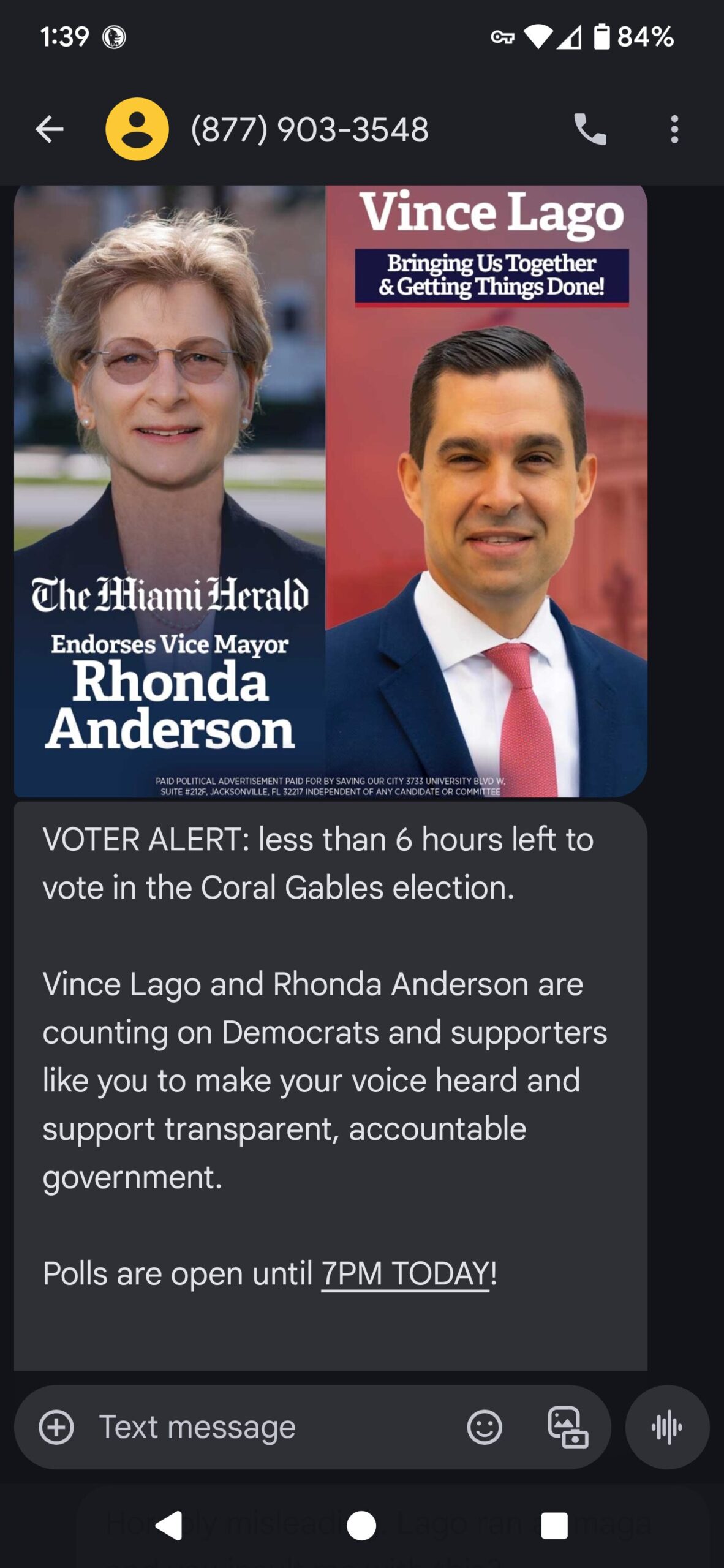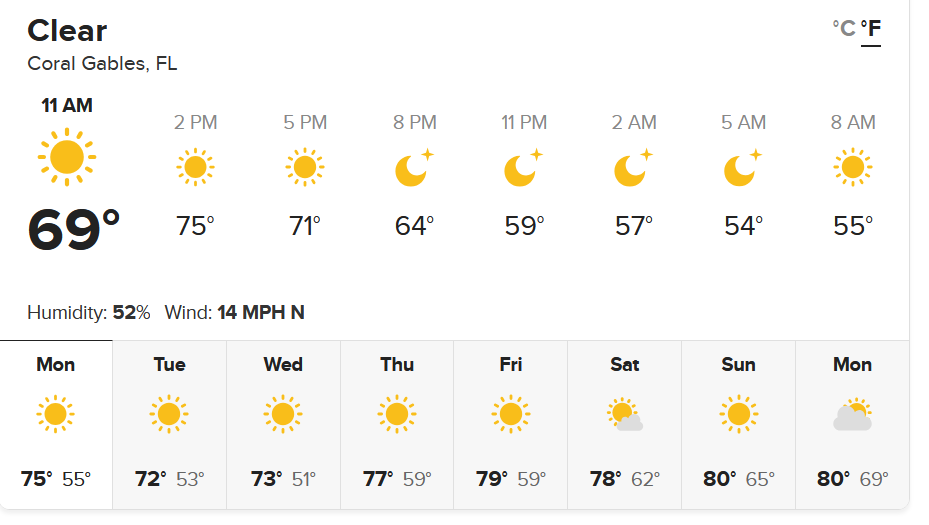People have been asking me if I have recommendations for the upcoming Coral Gables elections. The problem is that local politics have become depressing, and given the state of national politics I don’t have much energy left over.
But. Yes, I do. Two of the races are easy, one a bit less so but no less important.
TL/DR:
Kirk Menendez for Mayor,
Felix Pardo for Group II, and
Tom Wells for Group III.
OK, here’s how I got there, for those who might care.
There are a few obvious points to make. The first is that every single member of the current Commission is a problem, although some are worse than others. At present there are two factions on the Commission: One is the Vince Lago faction; the other is for the lack of a better term the anti-Lago faction. Two years ago Lago and his slate ran a well-funded pro-development campaign and were shocked when the voters didn’t hand them a majority, leaving Lago and (to my surprise) Rhonda Anderson on an island. The anti-Lago core is Ariel Fernandez & Melissa Castro, both half-way through 4-year terms, and they’ve pulled in Menendez as the swing vote; it seems Menendez was repulsed by Lago’s nastiness and what seems from a distance as under-handedness and over-friendliness to development.
The second is that some of the new candidates are every bit as bad as the incumbents they want to ally with.
The third is that we have a fundamental cleavage between the nasty-verging-on-evil candidates on one side and the incompetent-verging-on-destructive candidates on the other side. For me, though, this election is really a referendum on Vince Lago as much as anything else. The reason for saying this is that the errors the Lago faction would make–like over-development–cannot be corrected. The errors the anti-Lago faction make are mostly due to incompetence, and they can be corrected. Indeed with the right new blood I think they will be much improved.
Let me restate my priors here: the traditional dividing issue in Coral Gables has been how much development to allow. I’ve always opposed the hard-core NIMBYs but also the parties who take developer money in exchange for letting oversize development run wild. But, as the old Texas saying goes, in politics like in highways the only things in the middle of the road are a yellow stripe and a dead armadillo.
I think we’ve gone quite a bit too far in allowing monster complexes to take over downtown and elsewhere. They have changed the esthetic character of the city towards overpowering and ugly. They’re putting, or will put, a lot of small businesses e.g. on Miracle Mile, out of business. And while that ship may have largely sailed, we can stop making things worse and not allow it to spread further.
On the other traditional campaign issue – crime – I say that this is almost entirely demagoguery designed to frighten older voters and excite bigots. Between those two groups, however, the perennial crime “issue” gets traction. But not with me. On the whole we have pretty good cops, at least when the Commission isn’t busy messing with them.
There are also some new issues surfacing this year. One is the issue of whether it was wrong for the Commission to vote themselves salaries. I have always believed that even part-time Commissioners deserve a salary, and that all of us benefit it the pool of potential candidates is not limited to the independently wealthy, business owners, the well-salaried, and perhaps those in the pay of interests that have business with a city. I think Lago & Co’s harping on this is just more demagoguery; it’s not only patrician and exclusionary, but it’s a tiny fraction of the City’s budget.
On another issue, I think Lago is actually right: I’ve said for years we should move the date of the city’s elections to when we elect other offices. For the last 30 years or more, the Coral Gables establishment has steadfastly rejected this, arguing in public that voters get tire of long ballots so there is too much drop-off before they get the Commission races. In private I used to hear them say the real issue was keeping students at UM from voting. Moving the date would save the City money; but the real issue is what best serves democracy. The Lago people having lost an election on the unique date, it seems they think their chances would improve in a more general election. I say so be it; more participation is a good thing. But this is not a deal-maker or deal-breaker in the grand scheme of things.
This takes me to an element of the current scene that I find particularly offensive. The Lago team has its tame PAC, “Coral Gables First”. The name alone is offensive in two dimensions. To start with, if Coral Gables is “first” who is it who is “second”? Kendall? South Miami? Everyone else? This is not neighborly, and it’s not sensible. We’re in this together. Second, Coral Gables First is a clear dog-whistle to MAGA politics. That is about the last thing we need in an already over-polarized political community.
Unfortunately, the MAGAfication of our local politics is of a piece with what has become the Lago M.O.: when Lago ran first ran for office he looked me in the eye and said he had no ambitions beyond serving on the Commission, and giving back to the City. To my shame, I believed him. Perhaps it was even true back then, but now there is no question now that Lago has the bug.
The amassing of a huge war chest, the creation of a formal slate in the last election, and the early embrace of “critical theory” as an enemy were all signs of someone who had drunk the MAGA Kool-Aid and had ambitions for greater things, perhaps even Congress. After all, it worked for Marco Rubio didn’t it? In any case, losing his majority on the Commission must have been a great shock, and what there was of Lago’s civility vanished.
Admittedly it must be hard for Lago, who at least understands how the city works, to be consistently outvoted by a group which follows Ariel Fernandez’s lead and sometimes give the impression that it is at sea. Fernandez has lived down to his political history as an aide to the corrupt David Rivera. But even so, stupid—even when it messes up hiring a City Manger–is better than evil. And in any case Fernandez is not the ballot this year, but Lago is.
Lago’s chief opponent is Kirk Menendez. Of the current governing majority on the Commission, Menendez is the least troubling, but mostly in the nonentity sense. He came into office, I thought, prepared to ally with Lago but at least from out here it looked like he got offended by Lago’s high-handedness and pro-development stance and switched sides. I’m not going to argue that Menendez is wonderful. But he’s better than the alternatives.
Before she got elected Rhonda Anderson seemed like a classic good government candidate, one who came up through the ranks and had grass roots interests at heart. I’ve been bitterly disappointed by her voting record, which is to support Lago in all he does and what limited leadership we’ve seen has not been in the direction of listening to or empowering residents. Felix Pardo seems like a far better choice. He’s been around a long time, and served his time on numerous city boards. He’s endorsed by the Police, the Firefighters and (yikes?) the Teamsters (solid waste collectors). He sounds like the sort of candidate who used to run things in the good old days. Maybe they were a bit clubby for my taste, but sometimes you don’t know when you are well off.
In Group III the leading candidate is likely Richard Lara, who might make Lago look good. Our only hope here is Tom Wells. One of his big issues is reopening Burger Bob’s about which I personally could not care less. And I think he’s on the wrong side of the election date issue. But he won’t be in the pocket of developers, he credibly claims to be not just an advocate but a practitioner of civility, and being a lawyer we can expect him to be more punctilious about following rules than some of the folks not on the ballot. Please please don’t vote for Lara.
So, bottom line:
Kirk Menendez for Mayor,
Felix Pardo for Group II, and
Tom Wells for Group III.


